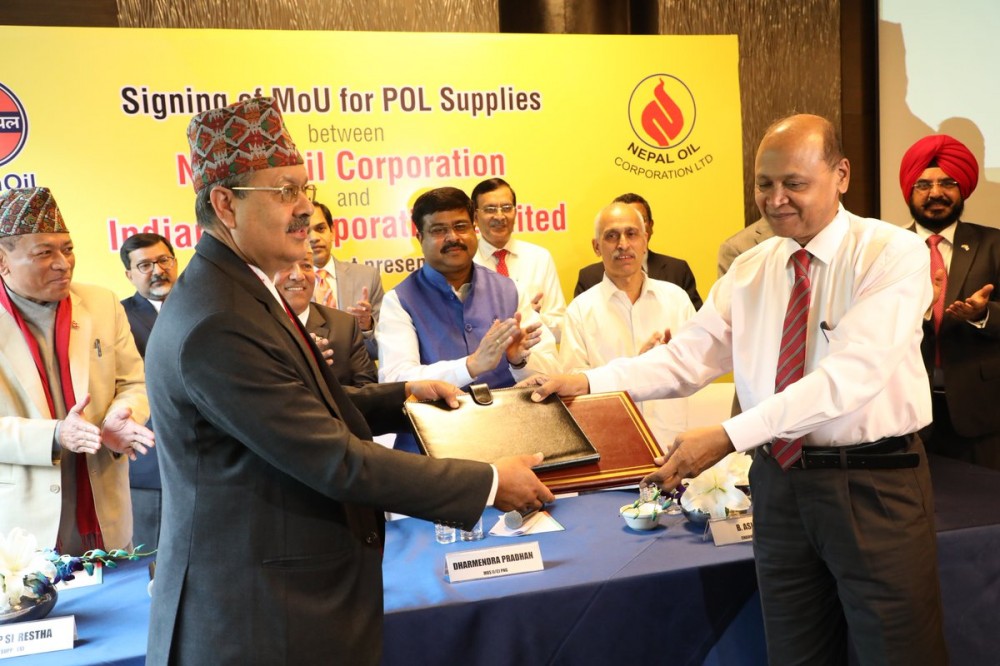India-Nepal: Oil Diplomacy Eases Tensions

KATHMANDU: The 2015 ‘unofficial’ border blockade by India is still fresh in the minds of countless Nepalis. The second blockade was a bitter reminder to the landlocked nation that India’s bureaucracy is determined to keep Nepal in its sphere of influence.
The first blockade was in 1989 when Rajiv Gandhi led the government. The second was when Prime Minister Narendra Modi, someone who had won millions of hearts in Nepal, had succumbed to the vices of Hindutva and was possibly misled by those around him.
The first blockade occurred because the Nepal government had decided to import oil from other nations and the second happened because of the 2015 constitution. In both instances, it was clear that India considers Nepal a backyard. However, there seems to have been a shift since 2015 although India has still not admitted that it was behind the blockade that deprived Nepal of essential commodities and fuel as well.
On Monday, Nepal and India signed a new five-year petroleum deal in which the southern neighbor has promised to supply 1.3 million tons of fuel yearly to Nepal until March 2022. The existing deal expires this Friday.
This deal has surfaced after the former prime minister K.P. Oli had approached China for an oil pact, which didn’t materialize as his tenure came to an end prematurely. What’s interesting about the new deal is that Nepal can now import oil from third countries if the Indian Oil Corporation (IOC) fails to supply adequate fuel to Nepal.
Also, IOC has agreed to waive interest for the Nepal Oil Corporation (NOC) in the event of delay in payment, and will assist in building petroleum pipelines and storages too. The agreement which started in 1974 has moved into a new phase. But the pertinent question remains whether Delhi will resort to another ‘unofficial’ blockade or whether it will fulfill its new promises.
Nepal’s key border points are Birgunj, Kakarbhitta, Jogbani, and Nepalgunj. Interestingly, all major trade borders of Nepal are linked with Bihar and Uttar Pradesh, which unfortunately brews unfortunate circumstances from time to time. The 2015 blockade too was linked with the Bihar elections and there’s speculation that the new Uttar Pradesh Chief Minister Yogi Adityanath might use hard and soft tactics to spearhead Hindutva in Nepal.
China, on the other hand, is not going to remain silent irrespective of India’s new move. The recent visit by PM Dahal to China and the meeting with Chinese President Xi Jinping is significant. China is determined to make Nepal sign up for the One Belt One Road (OBOR) initiative that India is opposed to. And the discomfort in New Delhi is further added to by China’s increasing footprint in both Pakistan and Sri Lanka. India certainly doesn’t want to lose its most important and valuable friend—Nepal.
Oil diplomacy seems to be working but it certainly raised a few eyebrows when the deal was sealed without informing the Foreign Ministry officials here. The NOC officials and Supplies Minister Deepak Bohara signed the deal where the Indian Foreign Ministry officials were present. This move is being criticized by a few Nepali commentators. Moreover, the new deal has surprised a lot of Nepalis who are still dealing with anti-India sentiments post-2015.
Will this new deal be a peace offering to Nepal by India? The emerging consensus in the media certainly seems to think that energy diplomacy will certainly defuse the tensions between Nepal and India.
India’s energy diplomacy might finally work with Nepal as the cold relationship would thaw after a period of distrust and grievances.At the same time, this agreement can create energy dependencies for Nepal and that remains a matter of concern.
Energy might bring Nepal and India back together. But again the question is: for how long and at what cost? That’s the burning concern. If India falters again, Chinese will easily win over Nepal due to their economic prowess. On the other hand, Nepal can no longer afford to remain an underdeveloped nation or give up its development aspirations to fuel dependency. This is what India should understand and continue to strengthen the close ties between Nepal and India sans arrière-pensée.
(Arun Budhathoki is our Nepal Editor)



